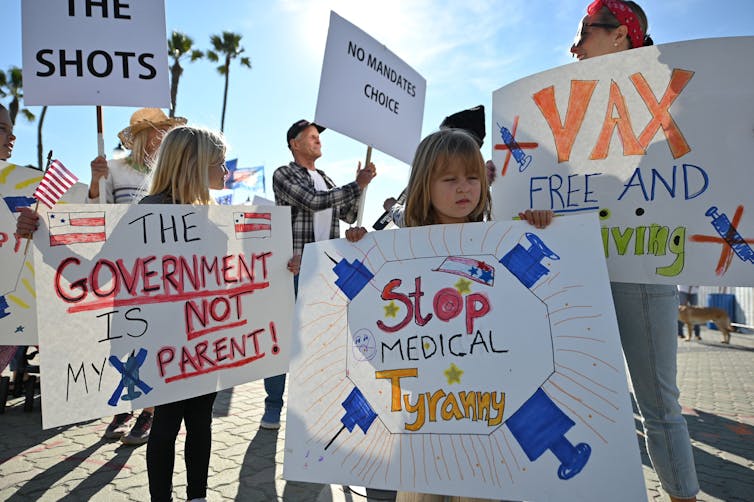In the recent film “Don’t Look Up,” two astronomers learn that a comet is on track to collide with Earth and destroy human civilization. When they try to sound the alarm, all manner of obstacles get in their way. In the end, well, you’ll have to watch the movie to find out.
The film is fiction, of course, but the situation illuminates one facet of reality: When people try to warn others of impending danger, success is not guaranteed.
Warning messages travel under a variety of names, including fear appeals, threat appeals and risk communication. As a communication scientist who has studied warning messages for 40 years, I’ve thought a lot about the question of when fear appeals are heeded and when they are not – a consideration that has undoubtedly been on the minds of many public health officials throughout the COVID-19 pandemic.
COVID-19: A ‘biological comet’
Fear appeals obviously aren’t limited to comets. Warnings about the unwanted consequences of smoking, texting while driving and drinking while pregnant can be considered fear appeals. So can food recalls, evacuation warnings and messages that encourage vaccination for the flu, polio and COVID-19.
Broad research literature reviews, called meta-analyses, find that fear appeals do work for most people most of the time.
And yet, consider where society finds itself today. For the past two years, people the world over have been told that they are in danger of contracting a potentially deadly disease – a sort of biological comet – and that a variety of health protective behaviors, such as social distancing, masking and vaccination, can save lives. Still, many people forgo social distancing, reject masking recommendations and continue to refuse a vaccine that will protect them. Why?

Robyn Beck/AFP via Getty Images
How fear appeals fail – at times
Understanding when fear appeals work and when they don’t requires some knowledge of what they are and how they function. Fear appeals have two distinct parts. The first part describes the danger. The second describes how to mitigate the danger.
If they are well crafted, the first part scares the people receiving the message and the second calms them down. As a person hears or reads a fear appeal from beginning to end, fear looks like an inverted U: It rises and then it falls.
Research I have conducted with my colleagues at Penn State shows that both the escalation and de-escalation of fear must occur for the message to be effective. Without the rise and the fall of fear, the message will fail. So what might interfere with this process?
A great deal hinges on what people believe about the supposed threat. If the problem is not seen as serious, there is no reason to be afraid, no need to pay attention to the recommended solution and no need to protect oneself.
From the earliest days of the COVID-19 pandemic, some message sources downplayed the threat. President Trump, for instance, compared the novel coronavirus to another disease that society has learned to cope with. “This is a flu. This is like a flu,” Trump said. Statements of this sort compromised efforts to convey the true risks of COVID-19.
And even a serious threat must be seen as relevant or it is unlikely to evoke strong emotion. Early in the pandemic, some areas were hit hard by the virus while others experienced relatively low infection rates. People living in those low-caseload areas often had only indirect information about the pandemic, often through social media. And social media contained a great deal of misinformation.
Strikingly, just 12 people were responsible for two-thirds of the misinformation about vaccines on social media platforms such as Twitter and Facebook. Joseph Mercola, an osteopathic physician with 3.6 million followers, notoriously and erroneously stated: “The same number of people died in 2020 that, on average, have died in previous years. This simply wouldn’t be the case if we had a lethal pandemic.” This blanket denial of the virus’s true impact allowed a great many people to conclude that the pandemic wasn’t a problem for them or for anyone else.
Then there’s the question of what can be done about the threat.
Health experts maintain – based on a vast amount of data and scientific evidence – that COVID-19 vaccines are highly effective. When individuals believe the remedy is effective, fear is diminished and the likelihood of action is enhanced. But beliefs about the vaccines’ effectiveness have been weakened by claims that the vaccine is too new and unproven or that its production was rushed.
Last, a key consideration is whether people can actually achieve the solution. Social distancing required pivoting to remote work and school, placing a huge burden on families that fell disproportionately on women. Meanwhile, high-quality masks were initially expensive and challenging to locate in a sea of counterfeits.
Just a year ago, in early 2021, vaccines were unavailable in many locations. And now, after navigating nearly two years of challenges in adapting recommended solutions, there is a real danger that pandemic fatigue will reduce motivation to adhere to safety guidelines.
Undermining the messenger
Fear appeals can also be thwarted in more general ways. For instance, by attributing nefarious motives to the government and public health officials, those who spread misinformation and conspiracy theories can cause others to discount any and all information coming from those sources.
As I noted above, research shows that fear appeals are persuasive for most of the people most of the time. However, the studies underlying that conclusion are primarily experiments in which fear appeals are compared with either some weak message or no message at all. In other words, these comparisons do not at all resemble the reality surrounding COVID-19.
Pro-vaccine messaging is taking place in a highly competitive message environment – one that involves active efforts to undermine public health advocacy. The inconsistent and contradictory messaging produced by health agencies such as the Centers for Disease Control and Prevention has damaged the effectiveness of fear appeals. The fact that scientific knowledge evolves and always possesses a degree of uncertainty explains why health agencies changed – and continue to change – their messaging. Regrettably, this inconsistency also undercuts the impact of health messaging in a public that wants simple, consistent answers.
And just as in “Don’t Look Up,” various groups and individuals have prioritized their own short-term gains over a genuine global danger. Those collective efforts have left large swaths of the population unconcerned or demotivated about a genuine global threat. This helps to explain why the U.S. has many more deaths from COVID-19 than do other wealthy nations. The parallels between cinema and reality are more than a little frightening.
[Like what you’ve read? Want more? Sign up for The Conversation’s daily newsletter.]
James Dillard, Professor of Communication Arts and Sciences, Penn State
This article is republished from The Conversation under a Creative Commons license. Read the original article.
















